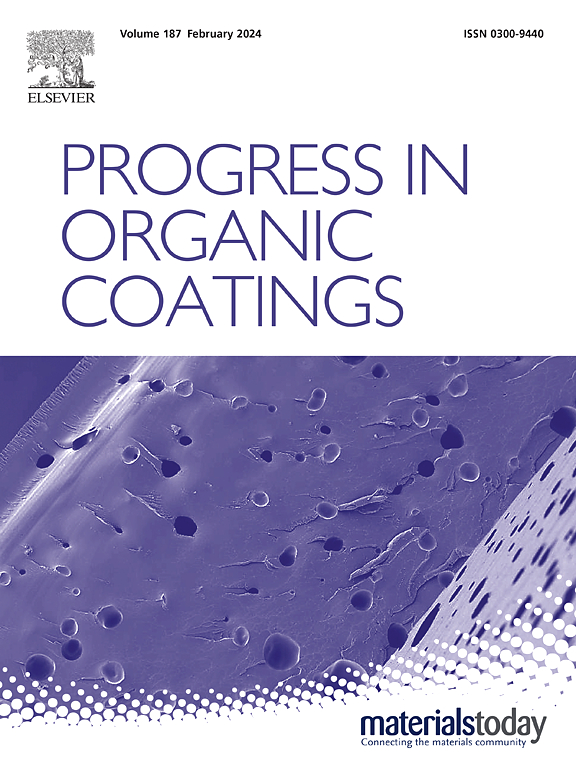结构类似双酚A的二羧酸类化合物的合成:用于研制稳定水性环氧涂料
IF 7.3
2区 材料科学
Q1 CHEMISTRY, APPLIED
引用次数: 0
摘要
传统水性环氧涂料配方中使用双酚A (BPA)对人体健康有害,固化膜韧性低,严重限制了其在许多领域的应用。大多数双酚a替代品增强了环氧固化膜的韧性,但在不同程度上损害了涂层的性能。因此,开发一种BPA替代品,在不牺牲模量和机械强度的情况下增韧环氧树脂,仍然是一个重大挑战。本研究以邻苯二酸酐和新戊二醇为原料合成了结构类似BPA的二羧酸化合物(PNP)。这种化合物可以代替双酚a。系统地探讨了不同PNP含量对水性环氧树脂及涂料性能的影响。结果表明,PNP更有利于制备粒径较小、储热稳定的水性环氧树脂。与双酚a改性环氧树脂相比,PNP显著提高了固化膜的断裂伸长率和拉伸强度。此外,不同的PNP含量可以显著提高涂层的抗冲击性能、抗拔附着力、耐水性、耐盐雾性和耐酸性,而不影响其他力学性能和耐碱性。本研究为制备环保、高性能、强韧、稳定的水性环氧涂料提供了新的思路。本文章由计算机程序翻译,如有差异,请以英文原文为准。
Synthesis of dicarboxylic acid compound structurally analogous to bisphenol A: for development of stable waterborne epoxy coatings
The use of bisphenol A (BPA) in traditional waterborne epoxy coating formulations is harmful to human health, and the low toughness of the cured film severely limits its application in many areas. Most BPA alternatives enhance the toughness of the epoxy cured film but compromise the coating's properties to varying degrees. Therefore, developing a BPA alternative that toughens epoxy resins without sacrificing modulus and mechanical strength remains a significant challenge. In this study, we synthesized dicarboxylic acid compound (PNP) with a structure similar to BPA, using phthalic anhydride and neopentyl glycol. This compound serves as a substitute for BPA. We systematically explored the influence of different PNP contents on the performance of waterborne epoxy resins and coatings. The results showed that PNP is more conducive to preparing waterborne epoxy resins with smaller particle sizes and stable heat storage. Compared with BPA-modified epoxy resin, PNP significantly increases the elongation at break and tensile strength of the cured film. Moreover, different PNP contents can significantly improve the coating's impact resistance, pull-off adhesion, water resistance, salt spray resistance, and acid resistance without affecting other mechanical properties and alkali resistance. This study provides a new perspective for preparing environmentally friendly, high-performance, tough, and stable waterborne epoxy coatings.
求助全文
通过发布文献求助,成功后即可免费获取论文全文。
去求助
来源期刊

Progress in Organic Coatings
工程技术-材料科学:膜
CiteScore
11.40
自引率
15.20%
发文量
577
审稿时长
48 days
期刊介绍:
The aim of this international journal is to analyse and publicise the progress and current state of knowledge in the field of organic coatings and related materials. The Editors and the Editorial Board members will solicit both review and research papers from academic and industrial scientists who are actively engaged in research and development or, in the case of review papers, have extensive experience in the subject to be reviewed. Unsolicited manuscripts will be accepted if they meet the journal''s requirements. The journal publishes papers dealing with such subjects as:
• Chemical, physical and technological properties of organic coatings and related materials
• Problems and methods of preparation, manufacture and application of these materials
• Performance, testing and analysis.
 求助内容:
求助内容: 应助结果提醒方式:
应助结果提醒方式:


